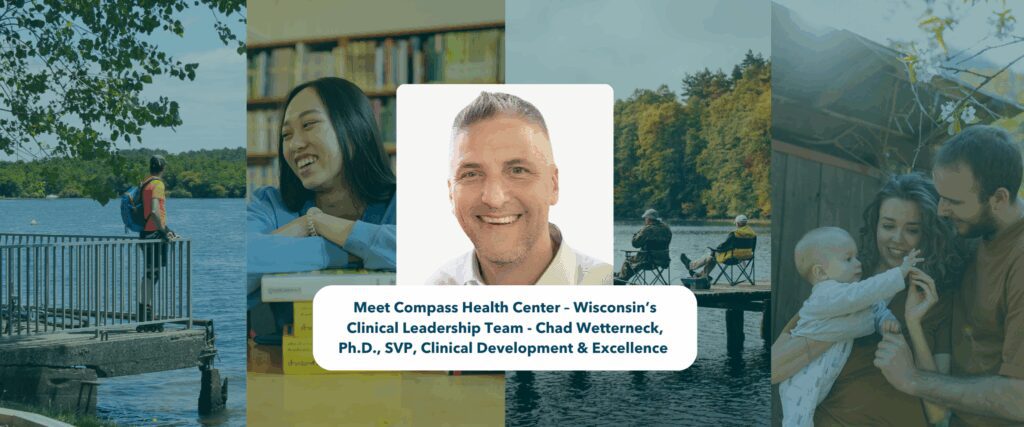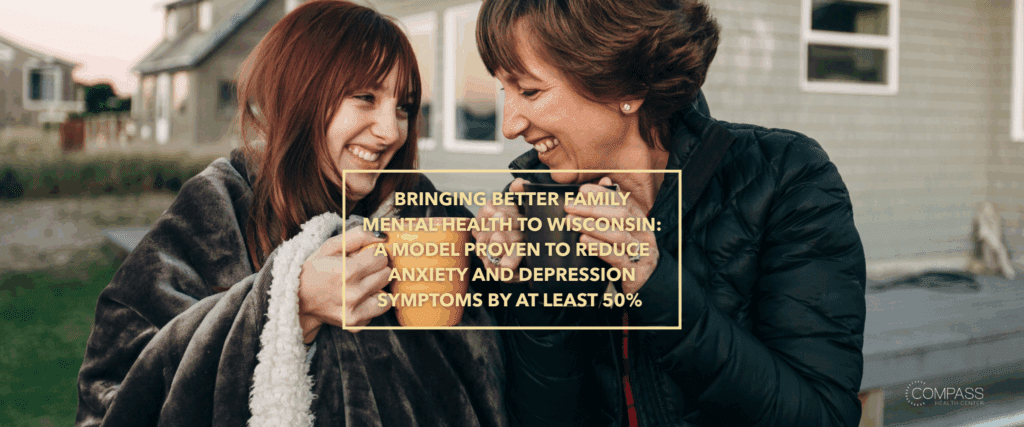
The Top 5 Signs Your Child or Teen May Benefit from a 2025 PHP or IOP Mental Health Summer Program
Summer break is often appreciated as a time for rest and freedom from school-related responsibilities. However, for many children and teens, the lack of structure can intensify emotional, behavioral, or mental health challenges. This is why summer is an opportunity to provide meaningful mental health support that prepares students for a more successful transition back to school.
Summer PHP and IOP programs can give children and teens the critical support they need.
If you are unsure whether your child or teen could benefit from a structured mental health program this summer, the following five signs can help guide your decision.
5 Signs Your Child or Teen May Benefit from a Mental Health Summer Program
1. Difficulties with Daily Functioning
When emotional or behavioral struggles begin to interfere with a child’s ability to function at home or in social situations, it may be time to explore a higher level of care than traditional, once-a-week outpatient therapy. Signs of these struggles could include:
- Refusing to get out of bed or complete basic tasks
- Avoiding family interactions or social plans
- Losing interest in hobbies or previously-enjoyed activities
- Isolating from peers or caregivers
These signs can indicate underlying concerns such as depression, anxiety, or trauma. A structured Partial Hospitalization (PHP) or Intensive Outpatient Program (IOP) for children and teens provides intensive, clinically-led support while allowing the child to remain at home each night or afternoon following daily support.

2. Ongoing School Avoidance—Anxiety or Distress About Returning to School
While summer often brings relief for students who struggle with school anxiety and refusal, the transition back to school in the fall can be especially challenging. For many, the worries don’t fully disappear—they just shift. As the new school year approaches, students may begin to experience:
- Avoidance when talking about school
- Fear of returning to the classroom
- Emotional distress tied to past school experiences
Summer can be an ideal time to build coping skills, strengthen emotional resilience, and begin addressing the underlying challenges that contribute to school avoidance. We support students in developing strategies over the summer to help them return to school in the fall with greater confidence and support.
3. Escalating Emotional Outbursts or Behavioral Concerns
Children and teens who thrive on structure may become dysregulated when summer routines shift or disappear altogether. Without the built-in schedule and activities that school provides, some kids may struggle to take initiative on their own, leading to boredom, isolation, or feeling down. While it can be healthy for some to take a break from routine, intentional, pro-social activities like camp can help support emotional well-being during unstructured time. Signs of dysregulation may include:
- Mood swings or increased irritability
- Verbal or physical aggression
- Difficulty coping with frustration or disappointment
- Impulsivity or risk-taking behavior
Compass Health Center’s summer PHP and IOP programs offer consistent routines, therapeutic structure, and access to evidence-based approaches such as cognitive behavioral therapy (CBT), dialectical behavior therapy (DBT), acceptance and commitment therapy (ACT), exposure and response prevention (ERP), when indicated, and experiential therapies. These can help children and adolescents learn to manage emotions more effectively and strengthen family communication and connection.

4. History of Mental Health Challenges That Resurface Without Support
For children and teens with existing mental health diagnoses, summer can be a high-risk time for regression—especially if treatment is paused or if school-based supports are no longer available. This includes those managing:
- Obsessive-compulsive disorder (OCD)
- Trauma or loss
- Mental health and substance use concerns
- Depression or self-injurious behavior
Our summer programs are designed to maintain clinical progress, reduce the risk of escalation, and provide continuity of care between school years. Whether transitioning from a hospital setting or weekly outpatient therapy, Compass Health Center offers age-specific care aligned with each child’s unique needs.
5. Insufficient Progress in Outpatient Therapy
Many families find themselves in a difficult position when weekly outpatient therapy is no longer sufficient, but inpatient hospitalization is not necessary. PHP and IOP levels of care provide an effective middle path for:
- Children or teens whose symptoms are intensifying
- Those not responding to weekly therapy alone
- Families looking for collaborative, multi-disciplinary daily therapeutic care in a non-residential setting
Participants at Compass Health Center engage in daily group therapy, psychiatric care, individual and family sessions, and skill-building—all within a structured, supportive environment.
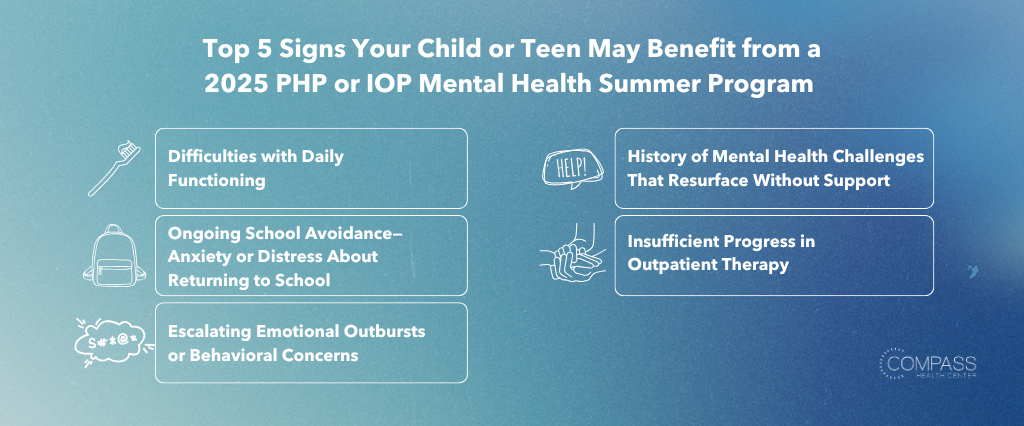
Compass Health Center’s Summer Session 2025
During Summer Session 2025, additional PHP and IOP programming is available to meet the needs of children, adolescents, and young adults during the school break.
Our summer programs are designed to help participants:
- Strengthen emotional regulation and coping skills
- Improve confidence and self-awareness
- Build peer connections through therapeutic groups
- Prepare for a smoother return to school routines
These programs include access to unique experiential tracks, such as our Creative Arts & Expressive Therapies Program, which blend clinical care with hands-on therapeutic engagement.
Learn more about Compass Health Center’s Summer 2025 Programs here.
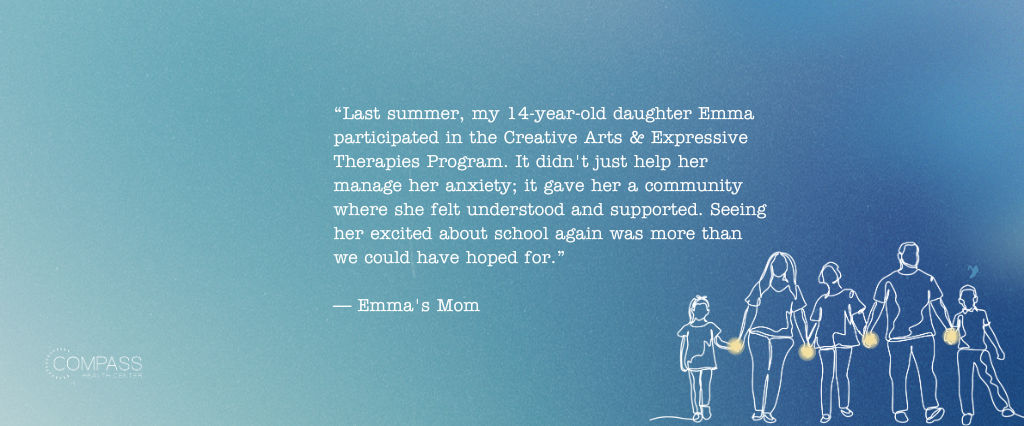
Frequently Asked Questions About Compass’s Summer Programs
What does a typical day in the Summer Programs look like?
Days are structured around group therapy sessions, activities in the Creative Arts & Expressive Therapies Program, and skill-building exercises. The environment is engaging, supportive, and developmentally appropriate.
What qualifications do your staff have?
All programs are led by psychiatrists, licensed therapists and specialists trained in child and adolescent mental health. Our team brings clinical expertise and a deep understanding of youth development and care.
How can I determine whether this program is the right fit for my child?
Our admissions team conducts personalized assessments to understand each child’s needs and recommend the most appropriate level of care. We encourage families to schedule a consultation to discuss specific goals and concerns.
What programs does Compass offer as part of the 2025 Summer Session?
In addition to our core programs—mood & anxiety, OCD, mental health and substance use (MHSU), trauma, mental health, chronic pain, and illness*—Compass offers specialized summer programming designed to support children, teens, and young adults during the unique challenges of the summer months. These may include academic support, college preparedness, creative arts, and structured peer connection opportunities. *Offerings vary by location and age group.
Why enroll now?
Planning ahead allows families to access timely care and ensure a supportive, purposeful summer for their child. Our PHP and IOP programs are designed to help children and teens build momentum during the summer, so they’re better equipped to handle the transition back to school.
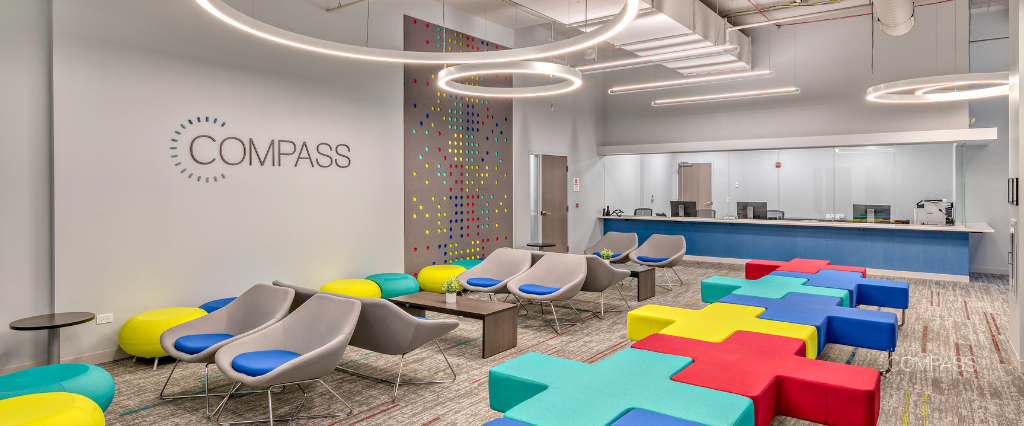
About Compass Health Center
Compass Health Center provides immediate access to specialized in-person and virtual PHP and IOP programs for children, adolescents, young adults, and adults experiencing mental health challenges that interfere with daily functioning.
We specialize in evidence-based care across several focus areas, including:
- Depression
- Anxiety
- Obsessive-Compulsive Disorder (OCD)
- Trauma
- School Anxiety and Refusal
- Mental Health and Substance Use
- Mental Health, Chronic Pain & Illness
Founded in 2011, Compass Health Center has expanded to serve thousands of individuals annually across Illinois, D.C., Maryland, and Virginia. We remain committed to providing immediate access to evidence-based, specialized care with no waiting list.
For more information or to schedule a confidential assessment within 24 hours, visit www.compasshealthcenter.net or call 877-552-6672.

